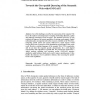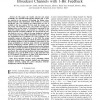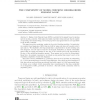63 search results - page 11 / 13 » The Expressive Power of the English Temporal Preposition Sys... |
LICS
2003
IEEE
14 years 20 days ago
2003
IEEE
Given a regular collection of Mazurkiewicz traces, which can be seen as the behaviours of a finite-state concurrent system, one can associate with it a canonical regular event st...
SIGSOFT
2007
ACM
14 years 8 months ago
2007
ACM
Automated verification is a technique for establishing if certain properties, usually expressed in temporal logic, hold for a system model. The model can be defined using a high-l...
W2GIS
2007
Springer
14 years 1 months ago
2007
Springer
One of the challenges raised by the construction of the semantic Web lies in the analysis and management of complex relationships (thematic, spatial and temporal) connecting severa...
CORR
2010
Springer
13 years 7 months ago
2010
Springer
In this paper, the ergodic sum-rate and outage probability of a downlink single-antenna channel with K users are analyzed in the presence of Rayleigh flat fading, where limited cha...
LMCS
2007
13 years 7 months ago
2007
Higher-Order Fixpoint Logic (HFL) is a hybrid of the simply typed λ-calculus and the modal µ-calculus. This makes it a highly expressive temporal logic that is capable of express...



